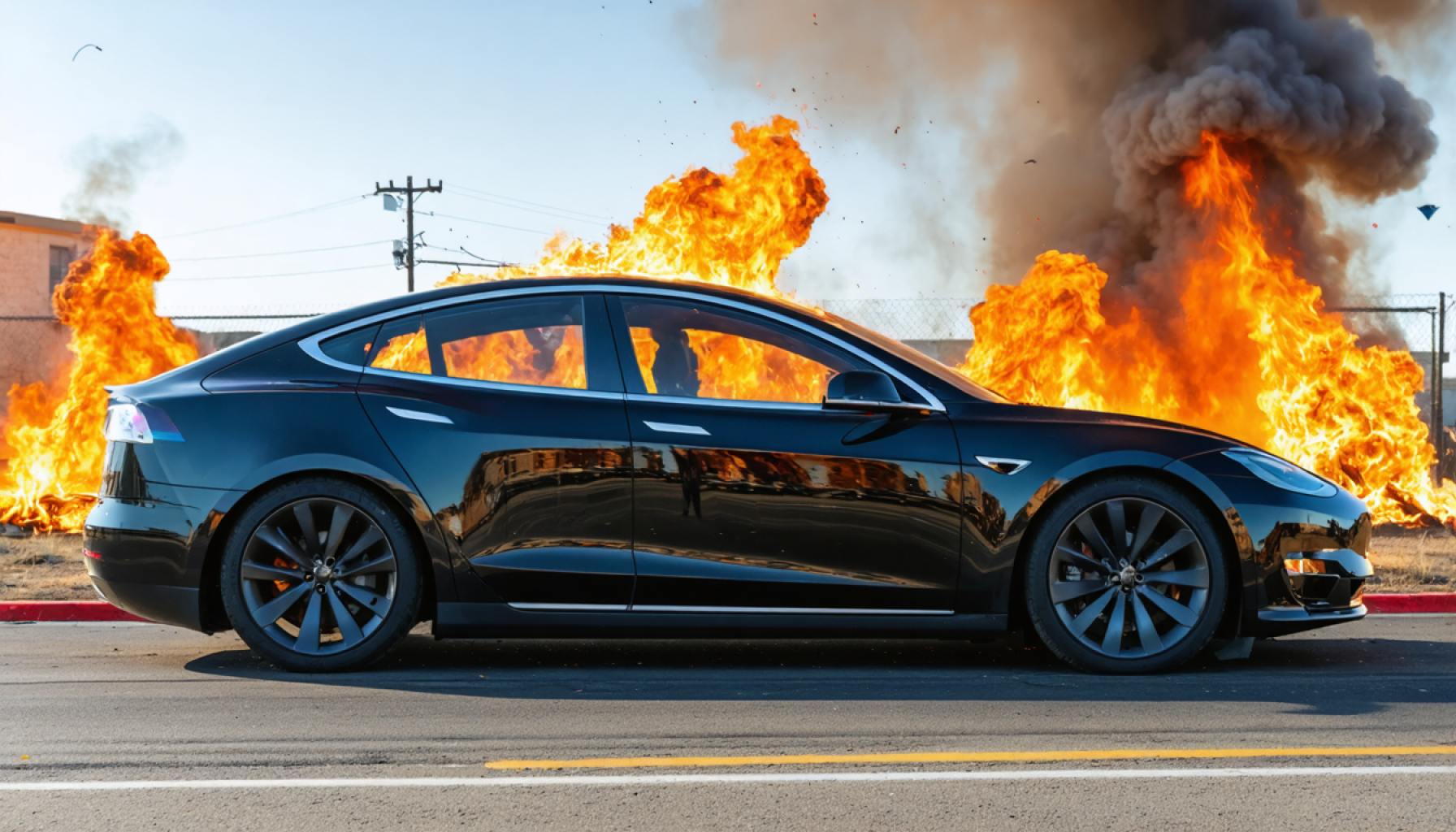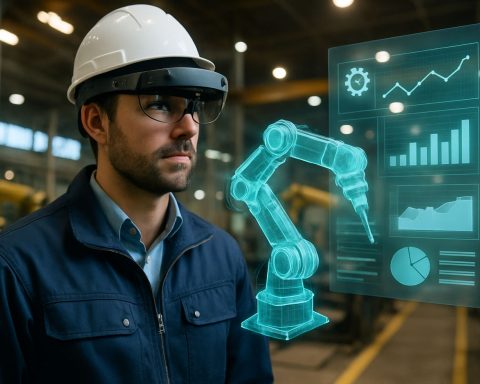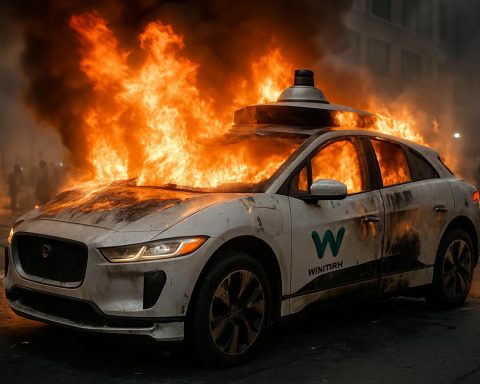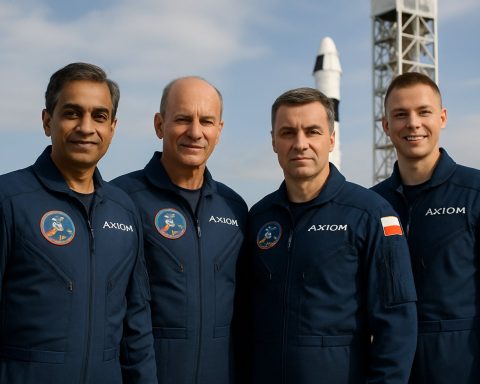- A Tesla Cybertruck was set ablaze in Kansas City, prompting federal investigation.
- 19-year-old Owen McIntire is charged with arson and possession of an unregistered destructive device.
- Tesla properties have become symbols in the societal debate amidst political turmoil and Musk’s budget cuts.
- Attorney General Pam Bondi highlights the tension as bordering on terrorism.
- FBI and ATF are vigorously pursuing evidence and arrests, reinforcing a commitment to justice.
- This event underscores a struggle to balance innovation with societal dissatisfaction.
- Authorities emphasize that the rule of law stands firm against reckless acts.
A dim, hazy morning in Kansas City took an unexpected turn when smoke spiraled upwards from the lot of a local Tesla dealership. The source was soon identified as a burning Cybertruck, its futuristic silhouette flickering in the relentless dance of flames. The fire, maliciously sparked on March 17, spread rapidly, engulfing another nearby vehicle as if grasping for a wild companion in its destructive descent.
The alleged arsonist, a mere college freshman on spring break, now finds himself at the heart of a federal investigation. The Department of Justice has thrust 19-year-old Owen McIntire into the spotlight, charging him with unlawful possession of an unregistered destructive device—an incendiary Molotov cocktail—and malicious damage by fire to property used in interstate commerce.
This fiery spectacle is not an isolated event. As tension mounts across the United States, Tesla properties have emerged as symbols of both innovation and ire. Amid the swirling chaos of political upheaval and budget-slashing directives from Elon Musk, who now wears the mantle of head of the Department of Government Efficiency under President Donald Trump’s administration, Teslas have evolved beyond mere vehicles. They have become flashpoints in a broader societal debate, targets in an insurrectionary mosaic.
The attacks, as described by Attorney General Pam Bondi, teeter on the edge of terrorism—blurring lines and challenging the nation’s resolve. The arson in Kansas City, paired with a recent firebombing at a Las Vegas Tesla collision center, serves as a harsh reminder of the tension winding through the fabric of American society.
The FBI, spearheaded by Director Kash Patel, and the Bureau of Alcohol, Tobacco, Firearms and Explosives (ATF) remain steadfast in their pursuit of justice. Federal agents meticulously comb through evidence, the grim testimony of burnt steel and scented kerosene lingering in the air. Their diligence has led to swift arrests, reaffirming a commitment that such reckless assaults on commercial properties will not stand unpunished.
As eyes widen and whispers intensify, Tesla’s plight transcends the corporate sphere. This saga of loyalty, protest, and destructive allure underscores a burgeoning struggle—to reconcile innovation with individual discontent. Despite the dissonance, a serene detour lies in the hopeful resilience ushered by agents, promising they will not rest until justice prevails.
In this tense narrative, one universal truth emerges: reckless defiance gains nothing. As authorities like Director Patel and Acting Director Dan Driscoll of the ATF bolster their resolve, one message is clear—regardless of political leanings or technological allegiances, the rule of law remains an unwavering beacon guiding this tempest-tossed ship to calmer shores.
The Fiery Saga of Tesla: Tensions, Technology, and Tactics
The Incident and Broader Implications
The incident involving a burning Tesla Cybertruck in Kansas City on March 17 has sparked wide discussions both in technology circles and among social analysts. This event, allegedly fueled by a college freshman’s misplaced defiance, has become emblematic of broader tensions in American society, highlighting a complex interplay between innovation, societal unrest, and political allegiances.
Key Facts and Emerging Trends
1. Tesla and Its Symbolic Role:
– Tesla, under the leadership of Elon Musk, has become a symbol of cutting-edge technology and economic promise. However, it also represents key points of contention amid political and social discontent, playing into both admiration and ire (Source: Bloomberg).
2. Security and Surveillance in Auto Dealerships:
– Incidents like the Kansas City fire have underscored the need for enhanced security at car dealerships, especially those featuring high-value electric vehicles. Industry experts recommend comprehensive surveillance systems and real-time monitoring to deter such acts of vandalism.
3. Legal and Regulatory Implications:
– The Department of Justice’s swift move to prosecute highlights an increased federal interest in protecting commercial enterprises linked with critical technology sectors. This may lead to stricter regulatory measures and more robust legal frameworks to deter similar events in the future.
4. Societal Reactions and Opinions:
– Opinion pieces and public reactions indicate a divide: some perceive Tesla as a harbinger of unwanted disruption, while others view it as a trailblazer for future sustainability. This dichotomy reflects underlying societal tensions (Source: The Atlantic).
How-To Secure Electric Vehicle Dealerships
1. Implement Advanced Surveillance:
– Deploy high-resolution cameras, both visible and infrared, throughout the dealership lot.
– Utilize AI-driven monitoring systems to detect unusual behaviors or activities in real-time.
2. Enhance Physical Barriers:
– Install reinforced fencing and access-control gates.
– Engage security personnel trained in crisis management.
3. Efficient Incident Response Planning:
– Develop and regularly update emergency response protocols.
– Conduct drills with local law enforcement to ensure readiness.
Market Forecast and Trends
– Electric Vehicle Market Growth:
– Industry reports predict that by 2030, electric vehicles will constitute over 50% of new car sales globally (Source: IEA).
– Tesla remains a market leader, yet also a lightning rod for criticisms linked to its public figures and rapid technological shifts.
– Changing Consumer Perceptions:
– As sustainability becomes a more central concern, the demand for electric vehicles like Tesla’s is expected to escalate despite social tensions.
Pros and Cons Overview
Pros:
– Tesla vehicles exemplify advanced technology and sustainability.
– Potential government incentives could further reduce electric vehicle costs.
Cons:
– Social and political controversies may affect brand perception.
– High-profile incidents could deter potential customers and investors.
Quick Security Tips for Businesses
– Enhance Communication Channels:
Ensure that all employees are well-informed about security protocols and have access to direct communication channels during incidents.
– Partner with Local Authorities:
Establish partnerships with local law enforcement for rapid response capabilities in case of emergencies.
Conclusion
Tesla’s current challenges, while daunting, reflect broader societal struggles with technological change and its repercussions. By understanding these dynamics and reinforcing security and community engagement, businesses can better navigate these tumultuous waters.
For more innovative solutions and industry insights, consider visiting Tesla.







